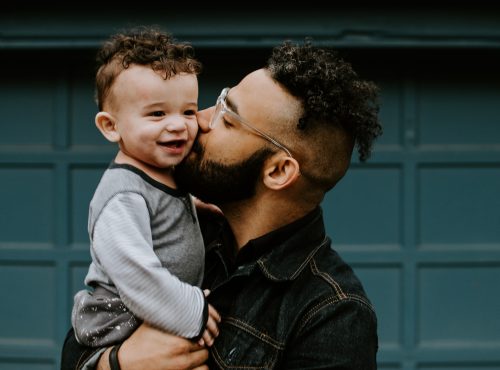We all know how exciting it can be to hear your baby babble his or her first words. But what about when your baby starts to grow up? How many words should a 15-month-old say?
There are many reasons a young toddler may struggle with speech and language development and not all reasons are bad. Join us as we explore the speech and language development of children around the age of 15 months old.
Is It Normal For a 15 Month Old Not to Talk?
That depends on what you mean by “talking”.
A child that is 15 months old is only expected to say about 3-5 words besides “mama” and “dada”. So, if your child has said words or has attempted words for a few things, this does count, even if the words for each item aren’t pronounced correctly.
To add to this, it is important to note that those deemed as “late bloomers” in terms of speech and language acquisition aren’t typically identified until they are about 18-30 months old. Even then, these children often go on to have normal speech and communication skills by the time they reach 3-5 years old.
If, however, you find that your child isn’t at least babbling or trying to form words by the age of 15 months old, it may be time to give your local pediatrician a call. One of the best interventions you can provide for your child is to nip speech and language issues in the bud as early as possible. Early intervention is key to remediate speech and language problems by identifying and addressing the cause of these delays at their source.

What Words Should a 15 Month Be Saying?
Remember, a 15-month-old child is only expected to have said 3-5 words outside of the typical “mama” or “dada”.
As your toddler continues to develop his or her language, other words, typically nouns, will start to color your child’s speech. Words such as “ball”, “milk” or other words that describe objects in your child’s daily environment are likely to crop up first.
Children this age are also very likely to begin mimicking phrases and words that are often said around them such as “uh-oh”, “no” or even “hi”!

15 Month-Old Development Red Flags
A 15-month-old that isn’t talking much may or may not be a major cause for concern. However, if you consider his or her entire speech and language trajectory over the course of his or her first year of life, you may discover clues as to whether or not the lack of words will turn into an ongoing issue.
These clues include:
- Doesn’t Coo or Babble Before 9 Months
- Doesn’t Say “Mama” or “Dada” (With Varying Level of Intonation) By 9 Months
- Doesn’t Say More Than “Mama” or “Dada” By 15 Months
Remember that just because you notice some of the aforementioned red flags doesn’t necessarily mean that your child has a speech or language delay. In fact, some children that don’t speak early in their childhood go on to speak just fine by the ages of three to five.
It is, however, important that you check in with your healthcare provider and let them in on what is happening in terms of your toddler’s speech and language development. He or she will be able to make the proper assessments to determine whether or not your child should receive services for remediation in the future.
In the meantime, do what you can to promote and encourage the use of words and phrases at home. More on how to do that later!
How Can I Encourage My 15-Month Old to Talk?
Encouraging your little one to talk is relatively easy to do. Most of the following suggestions can be performed at home, with little to no money effort spent.
Check out the following ways to bolster your child’s speech and language skills at home:
Narrate
Narrating is a great way to bring attention to words and vocabulary long before your child begins to speak. You can narrate everyday chores and tasks to your little one, from grocery trips to visits to the park.
For example, you could try saying, “Daddy is going to buy spaghetti this week” as you place a box of spaghetti noodles into your shopping cart. Or “Mommy is stirring a yummy bowl of chocolate cupcake batter” while inviting your toddler to help out with the process.
By telling your child what you are doing as you do it, you are helping to expand your child’s vocabulary in a very simplistic way.
Interact
Face-to-face interaction and genuine time spent together is a great way to not only bond with your child, but to encourage their use of language as well.
By talking with your child in situations that are relaxed, comfortable, and fun, your child is likely to open up and want to communicate their feelings with you in those moments. Be sure to reserve plenty of time in the day to spend talking with your child one-on-one.
Ask Questions
Posing questions to your child is another great way to build confidence in communication skills. This can be done even before your child is fully able to speak.
By posing questions to your child and then answering them yourself in a fun, enthusiastic–and maybe even LOUD– way, you will likely garner the attention of your child and make them want more.
For example, saying to a baby or toddler that isn’t yet talking, “Does Bobby want a piece of cake? YES! Bobby wants a piece of cake!” draws attention to the word “yes” and illustrates to your child the correct way to respond.
For children that can gesture or nod their head to answer questions, you shouldn’t answer for them, but instead, should wait patiently for them to answer. Patience is key!
Role Play
When spending one-on-one time with your child, engaging in pretend play can be an awesome and fun way to work on speech and language skills. As you pretend play with your kiddo, speak and act out things that are familiar and relatable to your child.
For example, if you are playing baby dolls with your toddler, try talking with and interacting with the doll in the same way you would your child. Moreover, be sure to name objects as you play. This can be done simply by saying, “Where is the doll? Can you find the doll, Molly? Oh, there she is! She was ‘under’ the table. Found you Dolly!” rather than “This is a doll, this is a bottle, this is a blanket…etc”.

Read Books
One of the very best things you can do to boost your child’s language development besides interacting with them is to read to them daily.
Choose books that are age-appropriate and that have relevance to their lives. Books that feature their favorite animal or even tasks they are familiar with i.e., baking, cleaning up their toys, going to bed, taking a bath, and so forth, are all great books to start with.
As you read, be sure to explain parts of the story in your own words after you’ve read the page to ensure that your child understands what is going on. Always refer to the illustrations to keep a toddler entertained.
Also, be sure to allow time for your toddler to enjoy books on his or her own by simply looking at the pages in his or her quiet time. This may instill in your child a love for books in the future.
Name It
Do you have a child that constantly wants you to name everything they see or touch? If so, jump at the opportunity! These are great times to engage your child in whatever it is they are curious about.
So go ahead, name that object for the 50th time, and when you are confident they know what it is, throw the question of “What is this?” back at them? This will encourage your child to name the object on his or her own.
Entertain
Some songs and shows are excellent for teaching children vocabulary words (though human interaction is always best). If there is free time in the day, consider popping on tunes by Super Simple Songs. They have a multitude of great learning songs for toddlers and preschoolers that you can either play on a screen or listen to through a loudspeaker. Note: Remember, screens are NOT recommended for children under the age of 18 months.
15-Month-Old Development Checklist
What Are Some of the Most Common 15 Month Old Milestones?
Important milestones for children that are 15 months involving language include:
- Looking at Objects When Named
- Following Directions With a Gesture and Spoken Directive
- Pointing to Signify Help
- Saying a Few Words Besides Mama and Dada
Early Intervention Is Best
Remember that although your child is still a toddler, the best course of action to remediate speech and language concerns is early intervention. Speak with a specialist about your concerns if your child is not on track with speech and language milestones as soon as possible for tailored and professional advice.
Read more on toddler care in the blog:
Leave a Reply